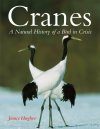"This book is both a good read and a useful resource for anyone interested in the conservation of some of the world's most beautiful birds."
- Birding Business Magazine 2009-12
"Hughes has produced a wonderful [...] beautifully produced book .. She writes beautifully and has given us a book that should serve as the standard reference work for general readers."
- Chronicle-Journal (Thunder Bay) 2009-10-05
"Cranes is a beautiful book about a beautiful bird and, unfortunately, a threatened one [...] In her informative and interesting book, Hughes looks ata the natural history of cranes as well as the decline of Whooping Cranes along with their modest recovery – including some of those responsible for helping to bring this tenacious bird back from the brink of extinction [...] Besides the informative text, there are numerous, beautiful colour photographs throughout the book. Cranes: A Nature History of a Bird in Crisis is an important book and will be of interest to anyone interested in animals, nature or history."
- MetroLand North.com 2008-09
"Hughes provides answers to a myriad of questions about cranes in this new examination [...] Beautifully illustrated."
- Nancy Bent Booklist 2009-01-01
"Cranes: A Natural History of a Bird in Crisis is a beautiful book about a beautiful bird and, unfortunately, a threatened one."
- N. Glenn Perrett, Lake Wah-Wash-Kesh Conservation Association 2008-12
"An intimate profile of these statuesque waders and a call for conservation."
- Science News 2009-01-03
"Anyone interested in cranes, especially the Whooping Crane, will enjoy this book."
- Scientific Life (Birdbooker Report 39) 2008-12-22
"Whoop it up for the 15 species of this endangered creature. Stick your neck out, wade right in, and Hughes' full treatment will reward your effort."
- Philadelphia Inquirer 2008-12-14
"Eye-catching photographs of 15 crane species [...] Hughes uses the whooping crane to tell the story of the human and environmental pressures leading to the decline of the cranes."
- Sharon Woofton, The Olympian 2009-01-03
"Sumptuous."
- Bill Robertson, The Star Phoenix 2008-12-13
"[Cranes] is more than a coffee-table book, giving us an opportunity to reflect on the complex ties that bid humans and birds."
- Eric Bodman, Montreal Gazette 2008-12-15
"Janice Hughes has done an excellent job of conveying the current state of scientific knowledge about cranes in an easily understandable fashion [...] Overall, the author succeeds admirably in chronicling the decline and gradual recovery of the Whooping Cranes in North America [...] Most [of the photographs] are of outstanding quality and they are a splendid and instructive support to a text that is easy to read. I strongly recommend this book to anyone who is interested in learning more about the biology and conservation of cranes in general and the Whooping Cranes in particular."
- Christopher J. Butler, Journal of the British Ornithologists' Union 2009
"Large, beautifully produced [and] has fantastic photography [...] enjoyable and comprehensive [...] Recommended to anyone wishing to learn more about [this] fascinating family."
- Grant McCreary, Wingbars.com 2009-04
"At its best [...] it is well-written, even eloquent, especially in sections discussing the plight of cranes [...] If you are interested in the fascinating account of the collapse and gradual recovery of the Whooping Crane in North America, coupled with an overview of cranes generally, then this could be a good book to acquire."
- Clive E. Goodwin, The Canadian Field-Naturalist, Vol. 121, 2009
"Easily the best account of America's effort to save from extinction the whooping crane, one of our rarest and, arguably, most beautiful birds. Over the years there have been several book-length accounts of these efforts [...] None of these is as complete as this book. Additionally, it is the most up-to-date, bringing the story of the whooping crane's recovery program up to the late summer of 2006 [...] This splendid book [...] is decorated with over 80 of the most spectacular crane photographs ever assembled in one place. My only regret about this book is that I hadn't written it."
- Paul A. Johnsgard, School of Biological Sciences, University of Nebraska-Lincoln Great Plains Research Vol. 20 No. 1, Center for Great Plains Studies, University of Nebraska-Lincoln 2010-03
"Beautifully done."
- Lois Cooper, Muskoka Today 2008-11-13








































